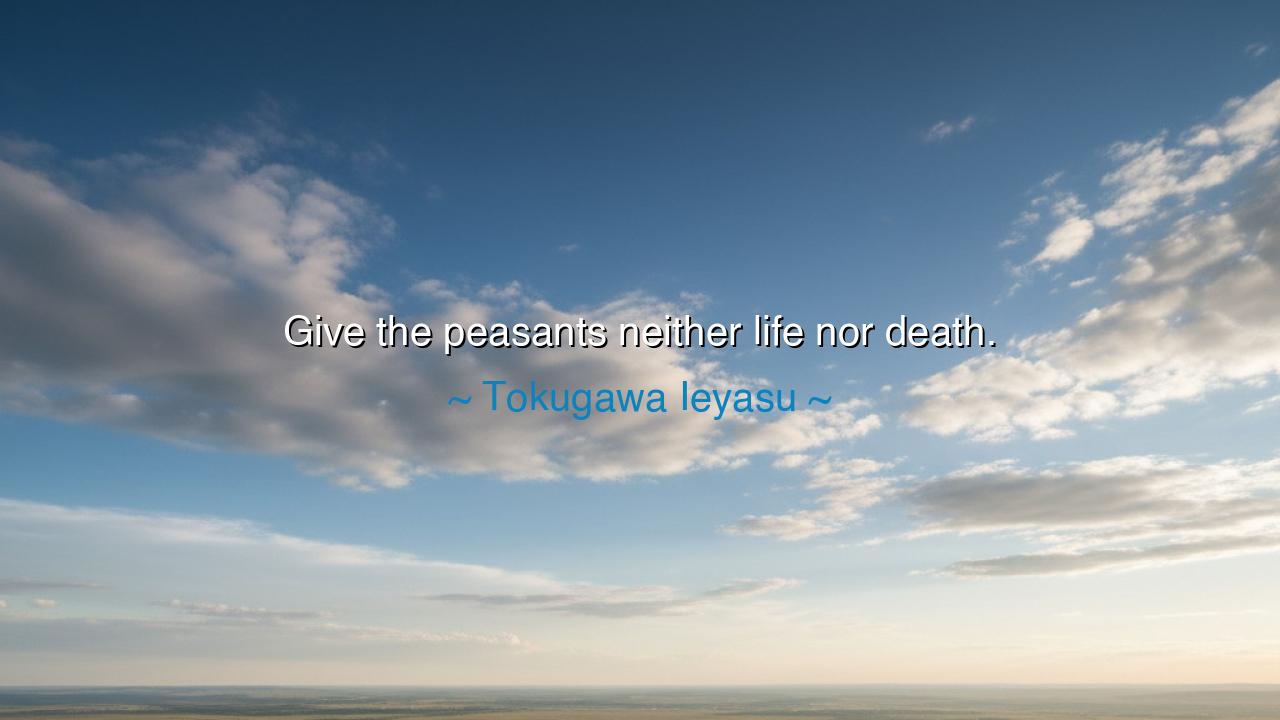
Give the peasants neither life nor death.






“Give the peasants neither life nor death.” So spoke Tokugawa Ieyasu, the shrewd and iron-willed founder of Japan’s final shogunate, whose reign brought two and a half centuries of peace after generations of bloodshed. To the unwise ear, these words may sound cruel, as though uttered by a tyrant hardened against the common folk. But beneath their sternness lies a deep, pragmatic wisdom—a ruler’s understanding of the delicate balance between mercy and control, between chaos and order. For Ieyasu, power was not the freedom to destroy or to indulge, but the discipline to maintain harmony in a world forever poised between plenty and ruin.
To understand his meaning, one must first know the age of turmoil from which he arose. For centuries, Japan had been torn by civil war—the Sengoku Jidai, the Age of Warring States—when rival lords raised armies from among the peasants, burning villages, seizing fields, and leaving the land desolate. When Ieyasu at last achieved victory at the Battle of Sekigahara in 1600, he faced a nation exhausted, hungry, and fractured. He saw that unrestrained mercy would breed rebellion, and unrestrained cruelty would breed despair. Thus, he forged a middle path: “Give the peasants neither life nor death.” Feed them enough to live, but not enough to grow restless; grant them safety, but not freedom to rise against the order that sustained peace.
In this, Ieyasu revealed his genius as a master of balance. He understood that a state, like a garden, must be tended with both kindness and discipline. Too much indulgence, and the weeds of ambition overtake the soil; too much harshness, and the roots of loyalty wither. His command was not one of hatred, but of maintenance. He saw human nature as a river—strong, restless, and dangerous when unconfined. The role of the ruler, therefore, was to channel its flow, not to destroy it nor let it flood unchecked. The peasants were the lifeblood of Japan’s order, and to “give them neither life nor death” was to keep that lifeblood steady—flowing, but never overwhelming the vessel of the state.
We may see echoes of this principle in the wisdom of the ancients. Han Feizi, the Legalist philosopher of China, taught that governance must rest upon control, for “too much mercy invites chaos.” Yet Confucius warned that rule by fear breeds resentment. Ieyasu, standing between these worlds, combined their insights: discipline without cruelty, mercy without weakness. He maintained peace by enforcing hierarchy, ensuring that each man knew his place and duty. Harsh, perhaps, but it was under this system that Japan flourished—its farms productive, its cities safe, its arts and culture blooming in an age of unprecedented stability.
Consider, too, the fate of those rulers who ignored such balance. In the waning years of the Roman Empire, emperors lavished gifts upon the people to buy loyalty, feeding them “bread and circuses.” For a time, it worked—but soon the citizens forgot virtue, and the empire, fat with indulgence, crumbled from within. In contrast, Ieyasu’s Japan endured. His successors, the Tokugawa shoguns, ruled for over two centuries, guarding the peace he had wrought. His principle, though austere, preserved the body of the nation. Like a doctor who denies pleasure to save life, he treated his people not as equals, but as vital organs—essential, but in need of governance for the health of the whole.
Yet, O listener, do not take this teaching as an excuse for tyranny. To “give neither life nor death” is not to withhold compassion, but to govern with restraint—to know when to act and when to refrain, when to reward and when to discipline. Every leader, whether of nations or households, must learn this art of measured strength. Too much generosity weakens the spirit; too much severity breaks it. True leadership, as Ieyasu knew, lies not in domination, but in equilibrium—the steady hand that guides without crushing, that protects without enslaving.
And so, from this ancient maxim, a timeless lesson emerges: govern your world as you would govern yourself. In your work, in your family, in your heart—practice the balance of Ieyasu. Do not indulge your desires until they rule you; do not starve them until your spirit dies. Give yourself neither life nor death—only the discipline to endure and the steadiness to grow. For peace, whether within or without, is not born from extremes, but from harmony. Thus did Tokugawa Ieyasu build an empire that endured for centuries—not by the sword alone, but by the mastery of measured control, the quiet wisdom to give neither life nor death, but the strength to give balance to all.






AAdministratorAdministrator
Welcome, honored guests. Please leave a comment, we will respond soon